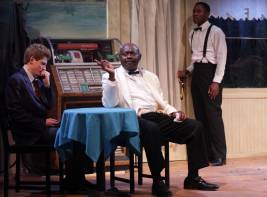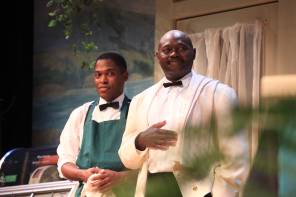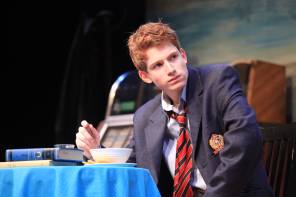
Sometimes the event of a single day, of a single conversation even, can change a person’s life forever. This is certainly the case for seventeen-year-old Hally in Athol Fugard’s “Master Harold”…and the boys, now playing at Ventura’s esteemed Rubicon Theatre in a couldn’t-be-better production.
“Master Harold” (written a dozen or so years before the end of Apartheid, South Africa’s system of legal racial segregation, and set in 1950, two years after the racist policy became law) is Fugard’s look back at the adolescence of a young man named Hally (Fugard’s childhood nickname) born the same year as Fugard. Though not precisely autobiographical, Fugard’s powerful, thought-provoking, potentially life-altering drama, helps explain the formation of one of South Africa’s most vocal white opponents of Apartheid, and reveals the seeds of the great writer and human being he was to become.
Growing up white and privileged in South Africa under Apartheid, young “Master Harold” takes his racial superiority as a matter of course, and one that he’s probably thought little about. Though Hally appears to have a warm, friendly relationship with Sam and Willie, the black waiters who work at his parents’ St. George’s Park Tea Room, and particularly with the more educated, father figure-like Sam, scratch the surface and racism is not far beneath.
We first meet Sam (Anthony J. Haney) and Willie (Chris Erric Maddox) as Willie prepares for the Easter Province Dance Championships. Willie is worried about the fact that his “woman,” Hilda, has not shown up for dance practice for the past three days. We soon realize that Willie is an abusive partner, and Sam’s reminder to him that “beating takes the pleasure out of ballroom dancing” reveals from the get-go Sam’s ability to impart bits of wisdom with humor and grace.
Hally (Daniel Stewart) arrives, catching Sam and Willy mid-step. Before long, the young man learns to his dismay that his mother has gone to the hospital to bring his ailing father back home … weeks sooner than expected or advised. This is bad news indeed for young Hally. The lad is already doing poorly in math, and if his amputee dad returns home before he has fully recovered from this latest illness, it will mean having to stay up all night massaging his father’s gamy leg, and possibly failing his exams.
As the play progresses, we learn more about Hally and Sam’s relationship. As a child, Hally used to hide under Sam’s bed, his favorite place to be when life around him proved too much to handle. He recalls when Sam made him a kite, and what a strange sight it must have been, a white boy and a black man old enough to be his father, out flying a kite. Still, it was a happy time for Hally, back then. Life felt the right size, he says. Not too big, not too small. “It’s got so bloody complicated since then,” he laments. Now, the teenager can only dream of “a world without collisions.” A phone call from his father reminds him how rough life’s bumps can indeed be, and provides the catalyst for the unforgivable act for which the real life Hally (Fugard) wrote this play as penance.
Rubicon’s Education And Outreach Director Brian McDonald played Hally at the very beginning of a busy, successful acting-directing career, thereby making his directorial assignment here a true match made in heaven. McDonald knows the play backwards and forwards, and coaxes from his three actors performances of stunning depth and power.
Haney first starred as Sam twenty or so years ago, and thus brings to the role both the truths discovered in that earlier performance and the life experiences gained since then. Warm, witty, loving, courageous, and possessed of a self-worth no impudent adolescent can diminish—Haney’s Sam is all of these, and the strength, outrage, agony, and ultimate dignity that Haney demonstrates in Sam’s final scenes are unforgettable.
Maddox shines in the considerably smaller yet nonetheless complex role of Willie, a man whose outward good cheer masks a life of servitude and racial abuse, and a sense of failure that he takes out on his dance partner, a textbook case of the abused becoming the abuser. The talented Maddox spends much of his time observing Haney and Stewart, exemplifying the notion that the ability to listen is essential to great acting.
Finally, kudos to McDonald and the Rubicon for having the guts to cast Stewart, an honest-to-goodness seventeen-year-old, as Hally, confidence in a rising young talent that the Academy Of The Canyons senior justifies in spades. First of all, seeing Stewart onstage makes one aware of just how much older most TV/movie/stage “teenagers” are than the characters they play. Stewart’s youth plus the extraordinarily powerful, nuanced performance he gives add up to absolute believability. The young actor’s charismatic stage presence is undeniable, as is the truth he brings to the role. Precisely because Stewart IS Hally’s age, his ultimate actions towards Sam are all the more shocking and repugnant to watch, yet somehow, in some way forgivable, as Fugard’s life has proven that they should be. Expect much much more from this gifted newcomer.
Scenic and lighting designer Thomas S. Giamario’s turquoise-hued Tea Room is beautifully, accurately, and precisely realized and lit, with some absolutely terrific period props and set dressing by T Theresa Scarano. Kudos go too to Kenny Hobbs’ sound design, Stacie Logue’s costumes, Rod Menzies’ dialog coaching (and to the three actors’ seemingly spot-on South African accents), and Katy Durham’s dance instruction. Linda M. Tross is production stage manager, Christina M. Burck production manager, and Daivd King technical director.
Apartheid may be a thing of the past in today’s South Africa, just as legally sanctioned racial segregation is in the United States, but racism is alive and well pretty much everywhere in the world. “Master Harold”…and the boys, Athol Fugard, and this superb production of his masterwork remind us of where we have been, where we are now, and how much still needs to be done until full equality for all citizens becomes the law of every land. Do not miss this extraordinary piece of theater.
Rubicon Theatre, 1006 E. Main Street, Ventura.
www.rubicontheatre.org
–Steven Stanley
February 12, 2011
Photos: Jeanne Tanner





 Since 2007, Steven Stanley's StageSceneLA.com has spotlighted the best in Southern California theater via reviews, interviews, and its annual StageSceneLA Scenies.
Since 2007, Steven Stanley's StageSceneLA.com has spotlighted the best in Southern California theater via reviews, interviews, and its annual StageSceneLA Scenies.







 COPYRIGHT 2025 STEVEN STANLEY :: DESIGN BY
COPYRIGHT 2025 STEVEN STANLEY :: DESIGN BY